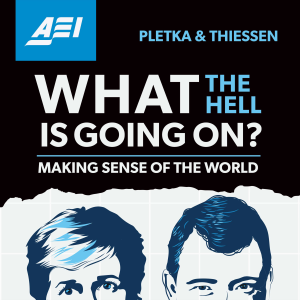
What the Hell Is Going On
News & Politics Podcasts
The American Enterprise Institute’s Danielle Pletka and Marc Thiessen address the questions we’re all asking in their podcast, “What the Hell Is Going On?” In conversational, informative and irreverent episodes, Pletka and Thiessen interview policymakers and experts, asking tough, probing questions about the most important foreign policy and security challenges facing the world today.
Location:
United States
Genres:
News & Politics Podcasts
Description:
The American Enterprise Institute’s Danielle Pletka and Marc Thiessen address the questions we’re all asking in their podcast, “What the Hell Is Going On?” In conversational, informative and irreverent episodes, Pletka and Thiessen interview policymakers and experts, asking tough, probing questions about the most important foreign policy and security challenges facing the world today.
Language:
English
Email:
podcasts@aei.org
WTH Would Any Republican Consider Ending the Filibuster? Martin Gold Explains.
Duration:01:12:45
WTH: How Do We Keep Neo-Nazis Out of the Conservative Movement? Eli Lake Explains.
Duration:01:12:27
WTH: Is Europe Lost? Adam O'Neal Explains.
Duration:00:58:28
WTH Do Mamdani and the Democratic Socialists Really Believe? James Kirchick Explains.
Duration:01:04:00
WTH Is Next for Ukraine and Israel? General Jack Keane Explains.
Duration:01:14:30
WTH Is Happening With Middle East Peace? Dan Senor Explains.
Duration:00:58:26
WTH Could Ukraine do with $300 Billion Russian Dollars? Stephen Rademaker Explains.
Duration:00:55:39
WTH Extra! Two Years Since October 7. Dany and Marc Discuss.
Duration:00:46:05
WTH Extra! Another Shutdown Showdown. Dany and Marc Discuss.
Duration:00:31:47
WTH: Trump at the UN. Brett Schaefer Explains.
Duration:01:04:00
WTH Is Next After the Assassination of Charlie Kirk? Marc and Dany Discuss.
Duration:00:47:53
WTH: Trump's Capital Crime Crackdown. Rafael Mangual Explains.
Duration:00:56:18
WTH There Is No "State of Palestine". Elliott Abrams Explains.
Duration:00:50:24
WTH Is the Path out of the Wilderness for the Democratic Party? Jay Cost Explains.
Duration:01:10:53
WTH Should I Read This Summer? "The CIA Book Club: The Secret Mission to Win the Cold War with Forbidden Literature" by Charlie English
Duration:00:46:15
WTH Should I Read This Summer? "Dinner with King Tut: How Rouge Archeologists are Re-creating the Sights, Sounds, Smells, and Tastes of Lost Civilizations" by Sam Kean
Duration:00:48:04
WTH Should I Read This Summer? "The Fate of the Generals: MacArthur, Wainwright, and the Epic Battle for the Philippines" by Jonathan Horn
Duration:00:44:44
WTH Should I Read This Summer? "Tides of Fortune: The Rise and Decline of Great Militaries" by Zack Cooper
Duration:00:42:41
WTH Is Responsible for Hunger in Gaza? Matti Friedman Explains.
Duration:01:03:51
#WTH: Is Britain Throttling Free Speech? Dominic Green Explains.
Duration:00:49:28